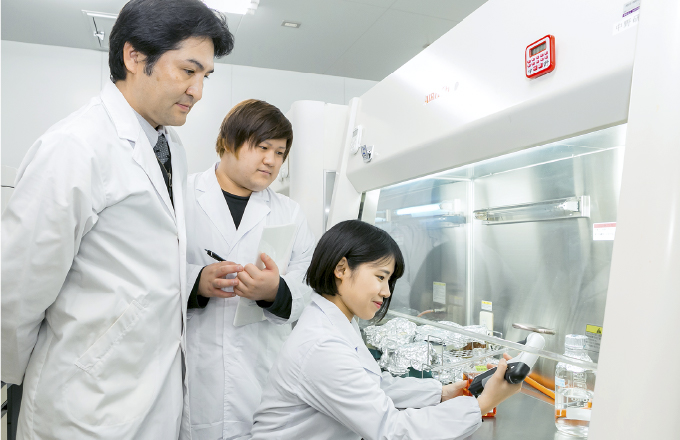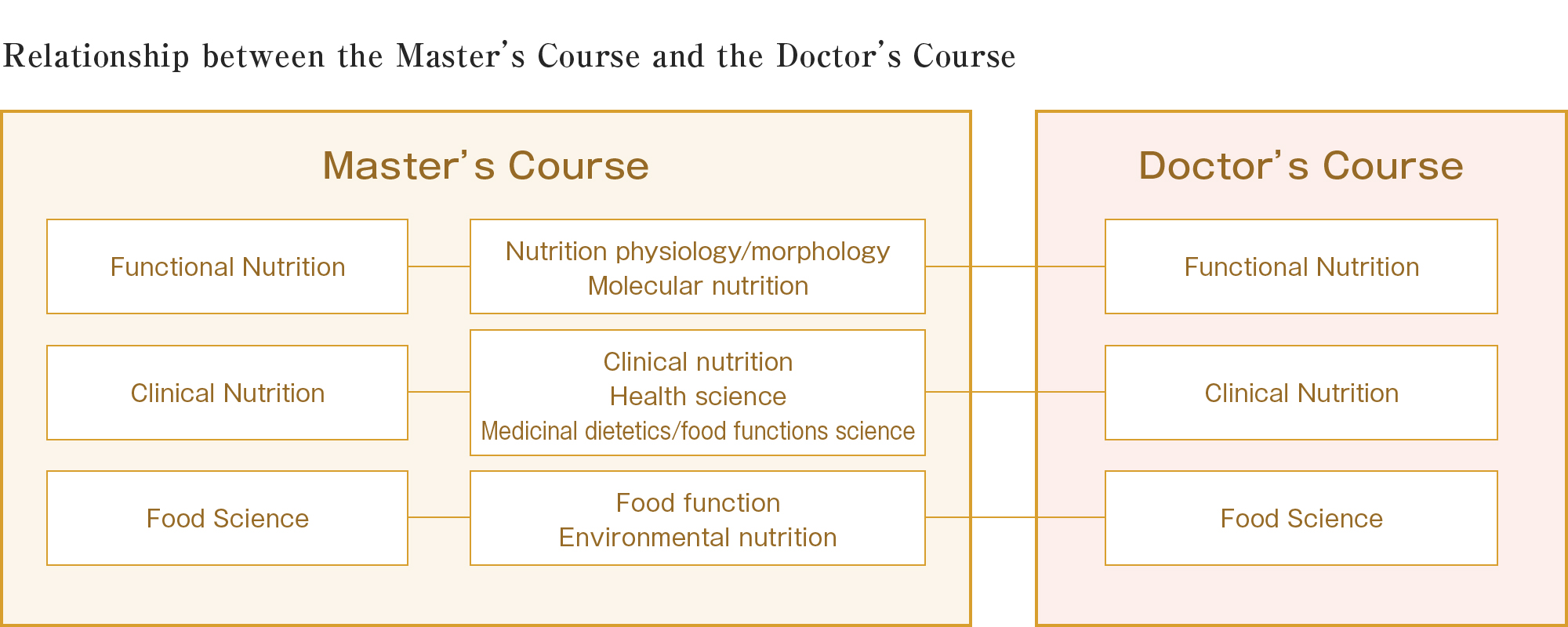Academics
Graduate School
Academics
Graduate School
A highly specialized educational institution pioneering the future of nutrition science
The Graduate School program is divided into a two-year Master’s Course and a three-year Doctor’s Course. As a highly specialized nutrition science educational institute that organically and comprehensively links food, life sciences, medicine, pharmacy, agriculture, and other disciplines, the program aims to train capable, practical nutrition science specialists in the Master’s Course and train researchers and practitioners with advanced knowledge and skills in the field of nutrition science and the capacity for independent research activities in the Doctor’s Course.
The Master’s Course covers the specialized fields of functional nutrition science, clinical nutrition science, and food science to develop highly specialized professionals, researchers, and instructors with the ability to contribute to the promotion of health through food. The Doctor’s Course seeks to foster independent researchers and nutrition science practitioners who are able to contribute broadly to society in the specialized fields of functional nutrition science, clinical nutrition science, and food science.
Students actively present research results at academic conferences and write papers while advancing research in their fields of specialty. They also work to interact with the local community to deepen experience outside the university. Many graduates of the courses are active as nutrition science specialists and researchers at universities, high schools, hospitals, health centers, companies, and other locations, meeting the societal need for the training of practical specialists and researchers in the field of nutrition science.


The following licenses can be acquired through the Graduate School Master’s Course.
* Possessing a Category 1 license for each is a requirement.
Most research academic advisors and research assistant advisors at the Graduate School also serve as faculty staff at the University’s Faculty of Nutritional Sciences. With outstanding records of achievement in nutrition science education and research, they perform instruction in education and research under systematic curricula. Students also attend the Asian Nutrition Science Workshop and Special Lectures held by the Graduate School every year and the Doctor’s Course Seminars held by Divisions. Opportunities are available to acquire knowledge of cutting-edge nutrition science research by domestic and foreign researchers.
Special research themes (Japanese Version Only)
The Animal Center is fully equipped with experimental equipment and instruments necessary for education and research in nutrition physiology/morphology, molecular nutrition, food function science, environmental nutrition, and more.
The school also promotes practical education and research through utilization of the University laboratories’ Health Promotion Center, Institute of Preventive and Medicinal Dietetics, and the Nutrition Clinic that is a medical facility.
The school also enhances education and research guidance through collaboration with Fukuoka University and Fukuoka Dental College as part of a liaison council of three schools located along the subway Nanakuma Line, and through exchanges with foreign students through an international exchange program.
The Graduate School of Nutritional Sciences Master’s Course (hereinafter “the Master’s Course”) covers the specialized fields of functional nutrition science, clinical nutrition science, and food science to develop highly specialized professionals, researchers, and educational instructors with the ability to contribute to the promotion of health through food.
The Graduate School of Nutritional Sciences Doctor’s Course (hereinafter “the Doctor’s Course”) seeks to foster independent researchers and nutrition science practitioners who are able to contribute broadly to society in the specialized fields of functional nutrition science, clinical nutrition science, and food science.
The Master’s Course accepts persons who possess qualities, capabilities, and ambitions as follows.
The admission selection method is divided into recommended admission screening, examination admission screening, working adult special admission screening, and international student special admission screening to select suitable human resources.
The Doctor’s Course accepts persons who possess the qualities, capabilities, and ambitions as follows.
The admission selection method selects suitable human resources through examination admission screening.
The Master’s Course offers the following curriculum for acquisition of the qualities and capabilities indicated in the Diploma Policy.
The Doctor’s Course offers the following curriculum for acquisition of the qualities and capabilities indicated in the Diploma Policy.
The Master’s Course confers a Master’s degree (Nutritional Sciences) on persons recognized as possessing qualities and capabilities as follows.
The Doctor’s Course confers a Doctoral degree (Nutritional Sciences) on persons recognized as possessing qualities and capabilities as follows.